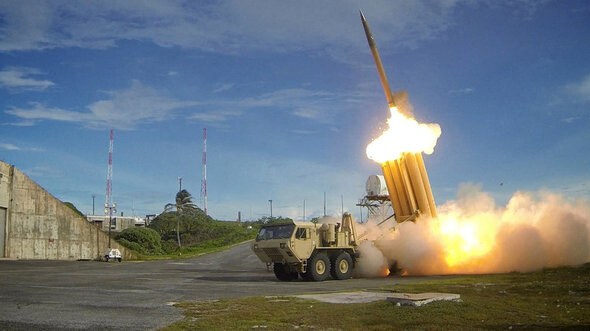hankyoreh
Links to other country sites 다른 나라 사이트 링크
THAAD deployment may lead China to reevaluate sanctions on North Korea

In China there is an increasing number of public voices arguing for the necessity of a global reevaluation of sanctions against North Korea, following the July 8 announcement from South Korea and U.S. of the decision to deploy a Terminal High Altitude Area Defense (THAAD) system in South Korean territory. As a backdrop to this discussion there is the understanding that the strategic balance in Northeast Asia has been damaged by the THAAD decision.
Zhang Jingwei, a research fellow with the Charhar Institute, a private think tank that specializes in foreign policy, discussed the impact of THAAD deployment in South Korea in a piece for China.org.cn. Zhang pointed out that “Our existing solutions to the nuclear threat in North Korea may very well lose their effectiveness. There may be need for additional measures on the part of China and Russia in regards to potential responses to the nuclear threat of North Korea.”
Zhang also argued that even in the case of a nuclear provocation on the part of North Korea, if the five countries involved in the Six Party Talks with North Korea worked together, they could prevent the situation from spinning out of control. Of the decision to deploy THAAD-which disturbed this framework-Zhang added that “its destructive impact is more serious than even the nuclear threat from North Korea.”
It is also possible that in time, mutual cooperation against the threat of North Korea’s nuclear power will collapse because the THAAD decision led to loss of Chinese trust for South Korea and the U.S.
Wang Junsheng, research fellow at the Chinese Academy of Social Sciences, wrote in a July 10 piece for Cankao Network (cankaochina.cn) that “THAAD deployment in South Korea destroys the mutual trust among China, the U.S. and South Korea in their efforts to solve the issue of North Korea’s nuclear program,” and judged that “The cooperation among China, the U.S. and South Korea has up until now been proven to be the most effective means, but this too will collapse with THAAD deployment.”
China has repeatedly brought up its responsibility as a permanent member of the Security Council in relation to UN-level sanctions against North Korea, with the stance that it would “fulfill its duties and promises to the international community.” It‘s the background to the emergence of perspectives that claim that China is not likely to suddenly change its stance. But with commodities for the “livelihood of the people” excluded from this, it is also possible that if China made up its mind, it could, with its indifference, ensure that the sanctions were effectively rendered impotent.
By Kim Oi-hyun, Beijing correspondent
Please direct questions or comments to [english@hani.co.kr]

Editorial・opinion
![[Column] Has Korea, too, crossed the Rubicon on China? [Column] Has Korea, too, crossed the Rubicon on China?](https://flexible.img.hani.co.kr/flexible/normal/500/300/imgdb/original/2024/0419/9317135153409185.jpg) [Column] Has Korea, too, crossed the Rubicon on China?
[Column] Has Korea, too, crossed the Rubicon on China?![[Correspondent’s column] In Japan’s alliance with US, echoes of its past alliances with UK [Correspondent’s column] In Japan’s alliance with US, echoes of its past alliances with UK](https://flexible.img.hani.co.kr/flexible/normal/500/300/imgdb/original/2024/0419/2317135166563519.jpg) [Correspondent’s column] In Japan’s alliance with US, echoes of its past alliances with UK
[Correspondent’s column] In Japan’s alliance with US, echoes of its past alliances with UK- [Editorial] Does Yoon think the Korean public is wrong?
- [Editorial] As it bolsters its alliance with US, Japan must be accountable for past
- [Guest essay] Amending the Constitution is Yoon’s key to leaving office in public’s good graces
- [Editorial] 10 years on, lessons of Sewol tragedy must never be forgotten
- [Column] A death blow to Korea’s prosecutor politics
- [Correspondent’s column] The US and the end of Japanese pacifism
- [Guest essay] How Korea turned its trainee doctors into monsters
- [Guest essay] As someone who helped forge Seoul-Moscow ties, their status today troubles me
Most viewed articles
- 1[Column] The clock is ticking for Korea’s first lady
- 2Samsung barricades office as unionized workers strike for better conditions
- 3After 2 months of delayed, denied medical care, Koreans worry worst may be yet to come
- 4[Column] Has Korea, too, crossed the Rubicon on China?
- 5All eyes on Xiaomi after it pulls off EV that Apple couldn’t
- 6[Correspondent’s column] In Japan’s alliance with US, echoes of its past alliances with UK
- 7US overtakes China as Korea’s top export market, prompting trade sanction jitters
- 8Hong Se-hwa, voice for tolerance whose memoir of exile touched a chord, dies at 76
- 9[Editorial] When the choice is kids or career, Korea will never overcome birth rate woes
- 10[Photo] Smile ambassador, you’re on camera